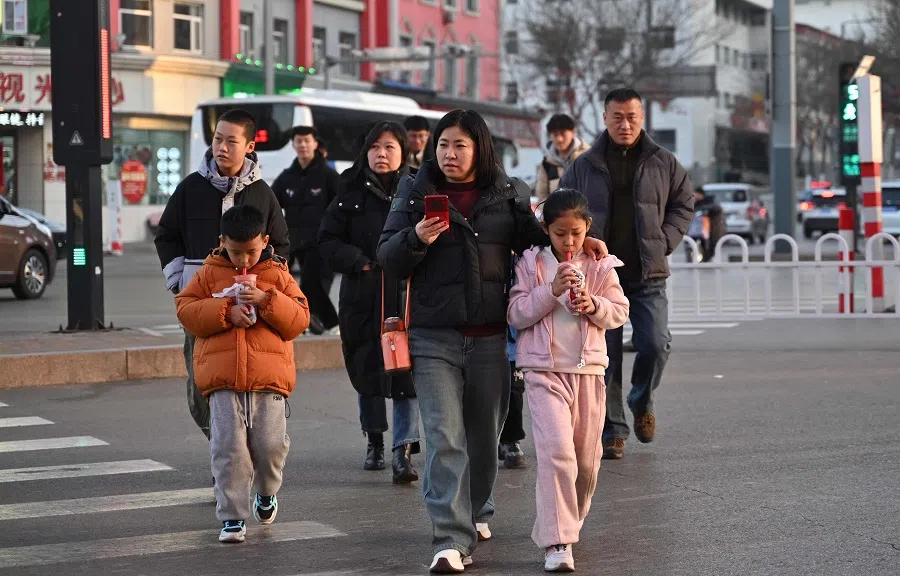The unpaid workforce: How housework fuels gender inequality in China
In modern society, care work has developed into a specialised profession known as domestic services. However, the unpaid nature of household labour, which are largely taken up by women, leads people to overlook its existence, its heavy burden and its value, says academic Zhang Tiankan.

Recently, in Shangqiu, Henan, a mother was spreading fertiliser on her own on over ten mu (about 1.65 acres) of farmland. Her five-year-old daughter felt sorry for her and secretly recorded a video for her father, who was working away from home.
Who is working?
“Dad, are you seeing this? Mum is spreading fertiliser all by herself, and no one is helping her.” When the mother later saw the video, she was deeply moved. She told reporters that her husband was the primary breadwinner for their family of five, emphasising the difficulty of his job outside and suggesting it was more valuable than her efforts at home.
Perhaps the mother’s humble reaction highlights a broader issue: many people, especially women, still do not consider household labour as real work. They see wage-earning jobs as the true measure of work. This perception contributes to ongoing gender inequality, as it underscores a disparity in how labour is valued. The root of this issue lies in the gap between perception and reality, fuelled by an unscientific understanding of what constitutes labour.
A thankless job
While the girl’s father works away from home to support the family, the mother is also doing the same by staying home to raise the children, care for the elderly and do household chores. Moreover, she also tends to the farmland — farming and spreading fertiliser are traditional forms of labour that are both exhausting and time-sensitive. This means that the mother is essentially doing two jobs: taking care of the family while also working in the fields.
It takes patience, attentiveness, physical strength and energy, all while consuming a person’s time and effort every single day.

While no one in life can completely avoid doing household chores (also referred to as “care work”) from their childhood, it is a question of how much. Housework — such as grocery shopping, cooking, laundry, cleaning, organising, raising children and caring for the elderly — may seem simple, routine and trivial, but in reality, it is an intense, physically and mentally demanding job. It takes patience, attentiveness, physical strength and energy, all while consuming a person’s time and effort every single day.
Therefore, in modern society, care work has developed into a specialised profession known as domestic services. In the past, only wealthy families could afford such professionals, such as butlers and servants. Meanwhile ordinary households handled housework themselves, with the heavy responsibility often falling on women.
However, whether in the past or present, household labour has been viewed as “dirty work” in two senses: first, because it involves cleaning, scrubbing toilets and other physically unpleasant tasks; and second, because it includes tasks that are tedious, exhausting or unappreciated. This is evident in the fact that housework is unpaid — the effort comes without reward, making it a thankless job.
... globally, women perform 76.2% of unpaid care work (household labour), which is 3.2 times that of men. In China, women spend approximately 2.5 times more time on unpaid care work than men.

According to the United Nations report “Care Work in China: Who does care work, what is its economic value and how has it been affected by Covid-19?”, globally, women perform 76.2% of unpaid care work (household labour), which is 3.2 times that of men. In China, women spend approximately 2.5 times more time on unpaid care work than men. The heavy and unequal burden of care responsibilities on women and girls is one of the main reasons for gender gaps in the economic and social aspects.
The unpaid nature of household labour leads people to overlook its existence, its heavy burden and its value. Even based on the market wage rates for domestic workers in China, the hourly wage in first-tier cities is around 30-40 RMB (US$4-US$5.50), proving that such labour has a value and market. However, because household labour does not generate direct financial compensation, some people perceive it as valueless. This is why the mother in Shangqiu believed that her husband was the only one “working” to support the family.
Quantifying housework’s economic value
Women’s care work is not only labour but also carries immense value. A 2021 divorce case in Beijing quantified the economic value of housework. In this case, Ms Wang filed for economic compensation after divorcing her husband, and the court ruled that her husband should compensate her with 50,000 RMB. The legal basis for this ruling was Article 1088 of China’s civil code, which states that if one spouse assumes greater responsibilities in raising children, caring for elderly family members, or assisting the other’s work, they have the right to request compensation upon divorce, and the other party is obligated to provide it.
The 50,000 RMB compensation was calculated as follows. In Beijing, men spend an average of 477 hours per year on housework, while women spend nearly 800 hours. However, it was Ms Wang who did the housework for both of them, so she worked a total of 1,277 hours annually. Based on Beijing’s 2020 minimum wage of 12.64 RMB per hour, Ms Wang should have received at least 16,000 RMB per year. Over three years of marriage, this amounts to 48,000 RMB, so the court awarded her 50,000 RMB. If calculated at the current market rate for domestic workers — at least 30 RMB per hour — Ms Wang’s compensation should have been over 100,000 RMB.
A study found that the global average female labour force participation rate is 48.5%, while in China, it exceeds 70%, ranking among the highest in the world. However, much of Chinese women’s labour time is spent on housework.

Sharing housework equally?
We should also see that Chinese women have quite a high labour force participation rate, both in formal employment and housework. A study found that the global average female labour force participation rate is 48.5%, while in China, it exceeds 70%, ranking among the highest in the world. However, much of Chinese women’s labour time is spent on housework. While women work an average of 472.9 minutes per day outside the home — only 19.1 minutes less than men — they spend an hour more than men on housework, totalling 106.9 minutes per day.
However, societal views on housework are gradually changing. A survey in Beijing found that at least 73.7% of respondents believe that household chores should be shared equally between spouses. But just as absolute equality is rare in any aspect of life, completely equal division of housework in every household is often impractical due to differences in gender, job nature and work intensity. One partner will inevitably take on more responsibilities than the other. Husband and wife need to discuss and coordinate. Men can of course take on more housework if they are able to.
... in China, women take on even more household labour as they age.
Gender differences exist in real life due to biological and social factors. Women are naturally warm, gentle and meticulous, and would spend more time raising children and caring for the elderly. For example, men are naturally not as good as women at handling children. However, these contributions have traditionally been seen as a natural duty for women, leading people to overlook the heavy workload and its economic, emotional and psychological value.
Furthermore, in China, women take on even more household labour as they age. A study found that for each additional year of age, a Chinese woman’s time spent on housework increases by 0.776 minutes per day. Women aged 50–59 spend an average of 205 minutes daily on household chores, while those over 60 spend even more time. Their labour deserves greater recognition and respect and even compensation — both economic and emotional — which is what men should give.

Today, both men and women should recognise that housework is hard work and a form of labour, no less valuable than formal employment. Only with this understanding can a solid foundation for gender equality be established. Additionally, assigning economic value to care work — or even increasing its value — can help legitimise it and benefit society as a whole.
China is an ageing society that needs caregivers and domestic workers. Raising their wages would get people to be more willing to do such work and help free people — especially women — from household labour. However, given technological advancements and developments in artificial intelligence, humanoid robots could be designed to assist with household chores in the near future.
In the Spring and Autumn period more than 2000 years back, the Chinese invented the lever irrigation system to fetch and transport water for crops. Today, technology has advanced to the point where humanoid robots could take over housework, freeing people from tedious chores. This is also a contribution to gender equality.




![[Big read] When the Arctic opens, what happens to Singapore?](https://cassette.sphdigital.com.sg/image/thinkchina/da65edebca34645c711c55e83e9877109b3c53847ebb1305573974651df1d13a)
